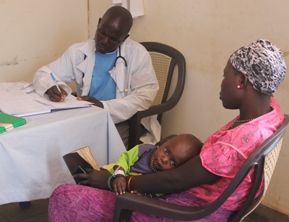 Photo: Pauline Ajello / WHO 14 May 2012 - South Sudan became WHO’s newest and youngest Member State after its independence on 9 July 2011. WHO supports the Government and health authorities at central and local level in strengthening health systems, addressing public health issues and supporting and promoting research for health.
Photo: Pauline Ajello / WHO 14 May 2012 - South Sudan became WHO’s newest and youngest Member State after its independence on 9 July 2011. WHO supports the Government and health authorities at central and local level in strengthening health systems, addressing public health issues and supporting and promoting research for health.
"WHO’s support in this country is immense", said Yona Kenyi, State Surveillance Officer.”We have many returnees from the north, coupled with inter-tribal conflicts and war in the border states. Without WHO's support, reaching millions of people and children in this country who require health services would have not been possible, although I admit there is still a lot to be done.”
Disease outbreaks are another major health challenge in South Sudan. Malaria remains a major problem and tuberculosis is on the rise. The risk of poliomyelitis (polio) importation is increasing as a result of cross-border population movements. Although HIV prevalence in South Sudan is low compared to countries of southern and eastern Africa, it is the highest in the Middle East and North Africa.
With South Sudan's current political problems and grim health statistics, WHO is committed to helping affected populations by providing life-saving medicines and health services. WHO’s work in South Sudan focuses on 10 priority programmes, the biggest of which is the Polio Eradication Initiative. The programme supports vigorous outbreak responses through national immunization campaigns. WHO continues to support the Ministry of Health to maintain the polio-free status of all 10 States of South Sudan, while also improving the coverage of measles immunization among children to contain the current outbreak.
WHO also works in the areas of emergency preparedness and humanitarian action; health promotion and protection; health system strengthening; integrated prevention and control of communicable and noncommunicable diseases; and primary health care. As the lead health agency in South Sudan, WHO supports the Ministry of Health in coordinating the health cluster in the country.
Besides these programmes, WHO also provides technical support to the Ministry of Health in health management information systems, maternal and child health/primary health care, environmental health, supply chain management, operational planning and mental health.



